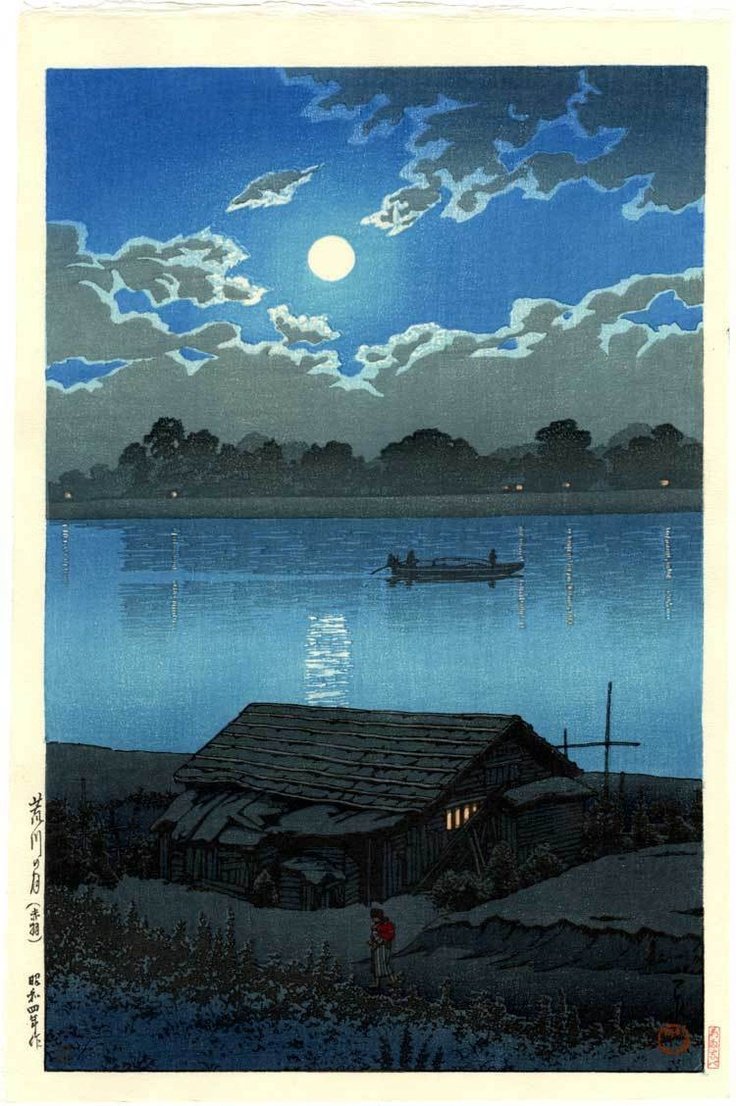The Thief and the Moon ~ Haiku of Japan
盗人に取り残されし窓の月
nusubito ni torinokosareshi mado no tsuki
the thief
left it
the moon at my window
—Ryokan
(trans. David LaSpina[1])

(Print by Hasui)
A few days ago I posted this haiku which is about as Zen as you are going to get. I mentioned that many pre-modern haiku very inspired by Zen Buddhism. Here's another similar one.
Ryōkan captures such an image that one can't help but love it. This image has been the basis for a famous "zen tale" in fact.
The tale goes as follows:
Ryōkan, a zen master, lived the simplest kind of life in a little hut at the foot of a mountain. One evening a thief visited the hut only to discover there was nothing in it to steal.
Ryōkan returned and caught him. "You may have come a long way to visit me," he told the prowler, "and you should not return empty-handed. Please take my clothes as a gift."
The thief was bewildered. He took the clothes and skunk away.
Ryōkan sat naked, watching the moon. "Poor fellow," he mused. "I wish I could give him this beautiful moon."
Some versions of the story feature a cushion instead of clothes, and others have him sleeping while the thief searches for things to steal and waking up to have the conversation, but minor differences aside it is the same story.
We can read the haiku (and the tale it inspired) literally, that the thief didn't stop to enjoy the wonder of nature, the beautiful sight of the moon. Or we can read it metaphorically, that in his haste to find and steal treasure, the thief failed to recognize that he was in the presence of an enlightened person and had a chance to learn about the secrets of life. The moon is often used as a metaphor for enlightenment. It works well on both levels, so however you choose to read it, it is a great one.
Ryōkan was an interesting guy and we can see how the story may well be true. He became a Sōtō Zen priest very early in life. After achieving enlightenment, he left the temple and became a hermit for most of the rest of his life. He was a compassionate guy to the extreme and loved helping others even though he had nothing of his own. We could use more like him in the world.
❦
 | David LaSpina is an American photographer and translator lost in Japan, trying to capture the beauty of this country one photo at a time and searching for the perfect haiku. |
That is, me! If you like this translation, feel free to use it. Just credit me. Also link here if you can. ↩
This post has received a 100.00% upvote from @fambalam! Join thealliance community to get whitelisted for delegation to this community service.
a perfect little message at the end of the end. I haven't gone to much into Haiku myself, but I just remember this book with Haiku with is in German. I guess I will get it out tonight!
ありがとう!
@maxinpower - Glad you enjoyed it 😃 Hope you enjoyed your book, as well. I think haiku are pretty much the best poems. Well, the best poem of all time is Prometheus by Goethe. But other than that, haiku all have my top spots.